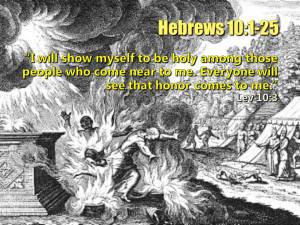 We must re-visit the incident with Nahab and Abihu. We still have much to learn about the Blood of Christ and presumptive worship of God.
We must re-visit the incident with Nahab and Abihu. We still have much to learn about the Blood of Christ and presumptive worship of God.
Lev. 10:3 Moses then said to Aaron, ‘The *LORD spoke about this. He said, “I will show myself to be holy among those people who come near to me. Everybody will see that honour comes to me.” ’ But Aaron was silent. v4 Moses ordered Mishael and Elzaphan to come. They were the sons of Aaron’s uncle Uzziel. (Moses) said to them, ‘Come (here). Carry your cousins’ (bodies) outside the camp. (Take them) away from the front of the *meeting tent.’ v5 So they came and carried them away outside the camp. This is what Moses had ordered them to do. (Nadab and Abihu) were still wearing their (priests’) clothes. v6 Then Moses said (this) to Aaron and to his (other two) sons, Eleazar and Ithamar. ‘Do not make your hair untidy and do not tear your clothes. (If you do,) you will die. Then (the *LORD) will be angry with all (the *Israelites). But your relatives (and) all the *Israelites may *mourn because of the fire that the *LORD sent. v7 Do not leave the entrance of the *meeting tent, or you will die. (This is) because of the *LORD’s *oil that *anointed you. It is still on you.’ So they did what Moses said.
Nadab and Abihu were the oldest of Aaron’s four sons. Their names are in 1 Chronicles 6:3. A censer was a flat pan that carried fire. What they did was not legal. It was wrong, for several possible reasons.
- They should have put fire into the censers from the altar, Leviticus 16:12. But perhaps they did not take their fire from the altar.
- Perhaps they tried to enter the most holy place. Only the chief priest could do this. He could only do it once a year on the Day of *Atonement, Leviticus chapter 16.
- Perhaps they decided to do this in order to oppose Moses and Aaron. Perhaps Nadab and Abihu thought that they themselves should be the chief priests.
- Perhaps Nadab and Abihu had drunk too much wine. So the LORD gave Aaron another rule in verse 9.
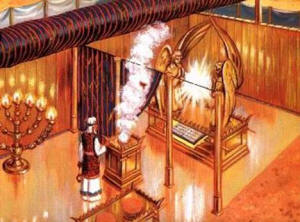 We can perhaps understand better the reasons for their deaths because some other people died in a similar manner (Numbers chapter 16). Those people decided, on purpose, to oppose the LORD (Numbers 16:11). Moses warned them severely about their actions. But they still decided to approach the meeting tent, with fire in their censers that God would not accept. Fire came from the LORD and it killed 250 men (Numbers 16:35). In both instances the Holiness of God consumed people who thought they had a right to draw near to God the way they presumed. They were putting themselves before God.
We can perhaps understand better the reasons for their deaths because some other people died in a similar manner (Numbers chapter 16). Those people decided, on purpose, to oppose the LORD (Numbers 16:11). Moses warned them severely about their actions. But they still decided to approach the meeting tent, with fire in their censers that God would not accept. Fire came from the LORD and it killed 250 men (Numbers 16:35). In both instances the Holiness of God consumed people who thought they had a right to draw near to God the way they presumed. They were putting themselves before God.
God has a Design for Man. That design dictates how we worship, how we relate to others, how we live. When we presume we can do whatever we want, we oppose the holiness of God. God said that all those that come near Him will know His holiness. To know His holiness is to be aware of our sinfulness. To approach Him without reverence is to presume upon His acceptance. I believe there is too much presumption in our worship of God today. You hear evidence of that presumptive “God Loves Me no matter what” philosophy in Christian music, movies and sermons. Tha Marican God is a Blessing God no matter what. The Lesson of Hebrews is that there is still a specific way we must approach God, and if we learn that, we will enjoy His presence and His power, and our faith will grow, and His works in and through us will grow.
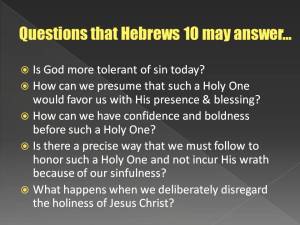 I am hopeful that at the conclusion of Hebrews 10 we will be ready for Hebrews 11. Hebrews 10 will allow us to answer questions such as these:
I am hopeful that at the conclusion of Hebrews 10 we will be ready for Hebrews 11. Hebrews 10 will allow us to answer questions such as these:
- Is God more tolerant of sin today?
- How can we presume that such a Holy One would favor us with His presence & blessing?
- How can we have confidence and boldness before such a Holy One?
- Is there a precise way that we must follow to honor such a Holy One and not incur His wrath because of our sinfulness?
- What happens when we deliberately disregard the holiness of Jesus Christ?
The Major Point of Hebrews 10
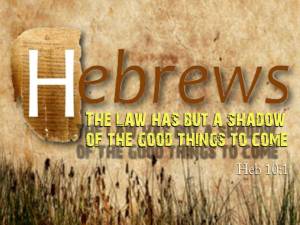 For since the law has but a shadow of the good things to come instead of the true form of these realities, it can never, by the same sacrifices which are continually offered year after year, make perfect those who draw near. Hebrews 10:1
For since the law has but a shadow of the good things to come instead of the true form of these realities, it can never, by the same sacrifices which are continually offered year after year, make perfect those who draw near. Hebrews 10:1
Review of Hebrews 8 & 9
1. Christ is our Heavenly Minister (Heb 8:2)
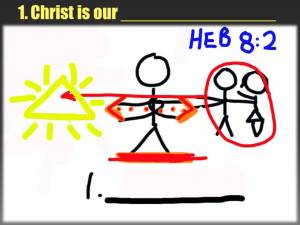 He is the one who ministered to the Holy Righteous demands of Jehovah God.
He is the one who ministered to the Holy Righteous demands of Jehovah God.- Through His sacrificial death, He allowed the Mercy of God to come to man from His Holiness and Glory.
- He sits in the dwelling place of the Majesty and ministers to all those who answer the call and draw near to God.
(A.) Christ is Uniquely Qualified to Minister to both God and Man (Heb 8:6)
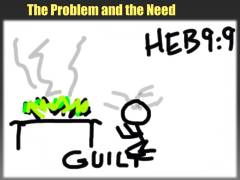
- The Eternal Value of the Covenant secured by His Blood
- The Better Promises which are the Foundation of this Covenant.
- The Promise of changed hearts and minds
- The Promise of eternal presence of the Holy Spirit
- How can we approach the Holines of God
- How can we be sure our works are pleasing to Him
- How can we be forgiven for not doing enough?
- How can I have God’s blessing even when I keep sinning?
- Purifies our concience
- Cleanses us from sins of omission and commision
- Allows us to serve the Living God with Living Works
- Christ is our Mediator (Heb 9:15)
(B.) Only Christ Ministers to our Great Need (Heb 9:9)
(C.) Christ’s Ministry is Through the Power of His Blood (Heb 9:14)
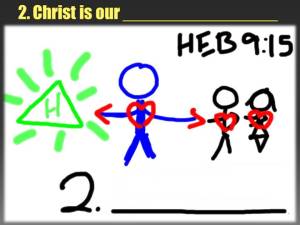
2. The Blood empowers Christ to be our Mediator
(A). Who is He a Mediator to?
- Mediator to those who answer the call
(B). What Does our Mediator Offer?
- His mediation allows the called to receive the promises (eternal inheritance)
(C). What makes His Mediation so Powerful?
- His mediation is based upon the power of His death to redeem us from the transgressions which separate us from Holy God.
- He mediates from the very presence of God on our behalf.
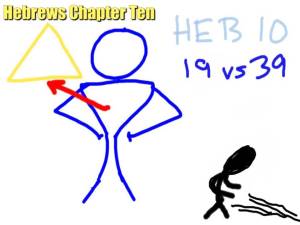 Hebrews 10 explains the impact of our Minister and our Mediator upon our lives. If you accept His ministry and mediation, you will never shrink back, you will always be going forward to Him and in Him!
Hebrews 10 explains the impact of our Minister and our Mediator upon our lives. If you accept His ministry and mediation, you will never shrink back, you will always be going forward to Him and in Him!
All because of the Value you place on the Blood of Jesus, you are either drawing closer or shrinking back.
The Law was but a shadow of good to come. (10:1)
- Never perfect those who draw near.(10:1)
- Never clear conscience of sin.(9:9)
- Never produced Living Works.(9:14)
The Law reminded you of your sin. (10:3)
- Sin focus rather than freedom focus
Christ came to do the Will of His Father (10:7)
- No pleasure in sacrifices and offerings (10:5,6)
- They had no provision for mercy justice and righteousness (Jer 9:24)
- Had no way to deal with the power of the sin of the flesh (10:4)
How Did Christ Open the Father’s Will to us?
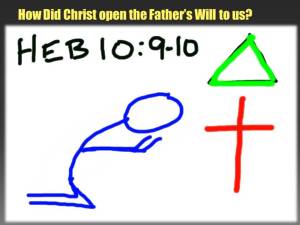 Jesus offered His body once and for all, opening the Will (Presence) of the Father to us (10:10)
Jesus offered His body once and for all, opening the Will (Presence) of the Father to us (10:10)
“I will not speak much more with you, for the ruler of the world is coming, and he has nothing in Me; John 14:30
- God was totally satisfied with His Son
- He has sanctified us (have been-it is our permanent state) (10:10)
What is the Father’s Will?
- That we be justified, righteous, sanctified and COMPLETE in Jesus Christ!
- having translated us from a state of unholy alienation into a state of consecration to God, having “no more conscience of sin” [1]
We are Now Perfected in Christ
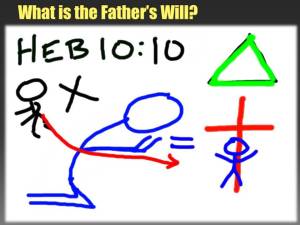
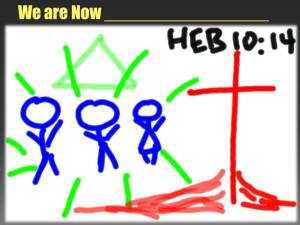 His sanctification has perfected us for all time and is based upon our sanctification accomplished by His once for all sacrifice. (10:14)
His sanctification has perfected us for all time and is based upon our sanctification accomplished by His once for all sacrifice. (10:14)
- The word “perfected” is the translation of teleioo which means “to bring to a state of completion.”[2]
- Them that are sanctified—Τους ἁγιαζομενους· Them that have received the sprinkling of the blood of this offering. These, therefore, receiving redemption through that blood, have no need of any other offering; as this was a complete atonement, purification, and title to eternal glory[3].
The What (Way)
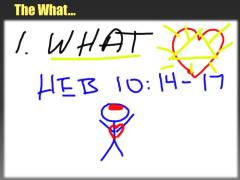 This sanctification allows the covenant of God’s law being written on our hearts and minds (10:16)
This sanctification allows the covenant of God’s law being written on our hearts and minds (10:16)
God will remember our sins and deeds no more (10:17)
The So What (Truth)
This Sanctification Gives us Confidence to enter the Holy Places by the Blood!(10:19)
Liberty, full access to the entrance of the holy place[4]
- A New and LIVING Way (10:20a)
- Through His broken Flesh (veil) (10:20b)
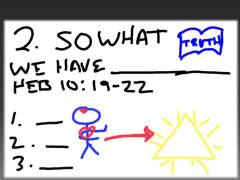 Keep Confident!
Keep Confident!
- Confidence in our priest (10:21)
- Confidence in our clean heart (10:22)
- Confidence in a clean conscience (10:22)
- Confidence in clean flesh (10:22)
- Confidence resulting in f.a. faith (10:22)
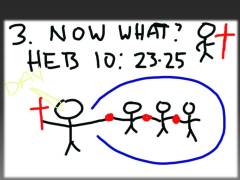 The Now What (Life)
The Now What (Life)
HOLD FAST the CONFESSION of YOUR HOPE for He is FAITHFUL! (10:23)
LOOK for ways to Stir one another Up! (10:24)
- Love and good works
- Meet together
- Encourage one another
- Look for the DAY!
Be Careful…Just Because the Veil is Torn…
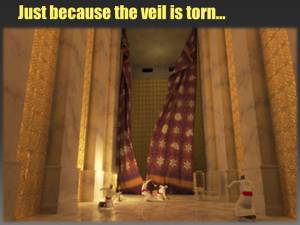 You must never, never presume that you are free to worship God any way you chose. Just because the veil was torn you may believe you have free access to God, that He is at your beck and call, at your disposal for whatever need you may have. There is only one reason that the veil was torn…God was satisfied with the blood sacrifice of His Son, Jesus Christ! We must always approach God in the one whose blood tore the veil!
You must never, never presume that you are free to worship God any way you chose. Just because the veil was torn you may believe you have free access to God, that He is at your beck and call, at your disposal for whatever need you may have. There is only one reason that the veil was torn…God was satisfied with the blood sacrifice of His Son, Jesus Christ! We must always approach God in the one whose blood tore the veil!
Understand the Altar…We Must Never Presume…
The Cross of Christ rose from the ashes of the Brazen Altar of Sacrifice. Habakkuk says that
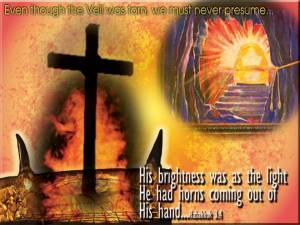
“his brightness was as the light; he had horns coming out of his hand…Habakkuk 3:4 The reference of the horns in his hand is a prophetic reference to the Cross. The four points of the Cross correspond to the four horns of the altar. In his hands refers to the scars that he bears from the crucifixion. We must always approach God through the horns of the altar, for they are in the hands of His Son!
[1] Robert Jamieson, A.R. Fausset, David Brown, A Commentary: Critical, Experimental, and Practical on the Old and New Testaments, (Toledo, OH: Jerome B. Names & Co., 1884), WORDsearch CROSS e-book, Under: “HEBREWS”.
[2] Kenneth S. Wuest, Wuest’s Word Studies – Volume 2: Word Studies in the Greek New Testament, (Grand Rapids, MI: Wm. B. Eerdmans, 1973), WORDsearch CROSS e-book, 176.
[3] Adam Clarke, A Commentary and Critical Notes, (New York: Abingdon-Cokesbury Press, 1826), WORDsearch CROSS e-book, Under: “Hebrews 10”.
[4] Adam Clarke, A Commentary and Critical Notes, (New York: Abingdon-Cokesbury Press, 1826), WORDsearch CROSS e-book, Under: “Hebrews 10”.




